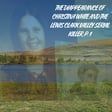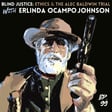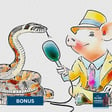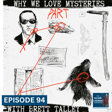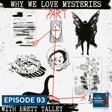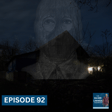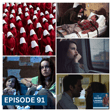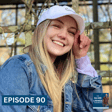Become a Creator today!Start creating today - Share your story with the world!
Start for free
00:00:00
00:00:01

79. Coming Out: Embracing Being LGBTQ+ in the Workplace
Today, we discuss the challenges for LGBTQ+ people when it comes to coming out in the workplace and the complex balancing act for companies, managers, and employees with our guest, Britt, who is also a member of the Monacan Indian Nation Tribe.
Visit our website and follow along with us on Instagram, join our Silver Linings Fireside Chat Facebook group and join us on Patreon.
Transcript
00:00:00
Speaker
You know, there's always fears. You don't want to be treated differently. You don't want to be viewed differently. And especially with somebody with anxiety. And in my case, I really like to be in control of things. And some of that is how people perceive me. I don't want that to change. I feel like, you know, so it's just a natural fear, but it's also It's kind of like
Introduction to Brittany Lawhorn's Career Journey
00:00:22
Speaker
skydiving. At a certain point, when you get on the plane and you know you told yourself you're gonna do it, you just have to jump and the right people will help you and they'll be your parachute. They'll guide you, they'll help you and you'll have a safe landing.
00:00:48
Speaker
From Goose Creek Consulting, welcome to the Silver Linings Handbook. I'm Jason Blair. That's Brittany Lawhorn. Brittany, or Brit as her friends call her, is the Director of Internal Operations and Chief of Staff at Goose Creek Consulting. Brit and I have worked closely together for several years in several different roles, and I consider her a friend. Britt is a graduate of Catawba College, where she earned a bachelor's degree in sociology and entered the job market in the heart of the COVID-19 pandemic.
00:01:20
Speaker
At Catawba, Britt received an award for the senior student at the university who demonstrates the strongest and clearest understanding of sociology.
Rapid Career Advancement at Goose Creek Consulting
00:01:30
Speaker
Upon graduating, Britt rapidly moved up from a position as an executive assistant to becoming a human resources specialist to taking on one of the most important people leadership roles in the organization. where she now oversees legal, compliance, accounting, human resources, and internal communication. Brett also holds a certification in critical thinking and problem solving from Duke Corporate Education and is certified in the Hogan assessments and holds the Denison Organizational Culture Certification.
00:02:04
Speaker
She's driven by being in a role that allows her to build creative systems and processes that ultimately help people.
Exploring Native American Heritage
00:02:12
Speaker
Britt's also a member of the Monacan Indian Nation tribe. When the English Jamestown settlers first explored the James River in 1607, The Monacons controlled an area that stretched from present-day Richmond, Virginia and west to the Blue Ridge Mountains. Within a hundred years, the Monacons had abandoned their homeland of more than 10,000 square miles. The Monacons were considered free people of color, a term in the American South for mixed African, European, and Native American peoples who had not been enslaved.
00:02:46
Speaker
It was not until 2018 that the United States government recognized the tribe which went from occupying thousands of square miles of modern-day Virginia to now holding on to a little more than seven acres of land near Bear Mountain, which is close to Lynchburg, Virginia. Britt, who passes for white, is in fact a double minority. who has been exploring her thoughts and feelings for some time.
Coming Out as Bisexual in the Workplace
00:03:12
Speaker
And she recently came out of the closet ah to some of her closest friends and shared that she was bisexual. Today, we're gonna talk about coming out in the modern workforce, the psychological and sociological factors at play, and the experience of being a silent minority in two respects.
00:03:45
Speaker
Hey, thanks for joining today. um I really appreciate the fact that you are open and willing and interested in talking about such a deeply personal topic. Absolutely. and just I'm so eager to see where the conversation takes us today. And thank you for making the time to have me today. Of course, I'll always make time to have for you. So I wanted to go ahead and get us started just talking a little bit about how we originally met. And we met in the heart of the pandemic. and And I'm just curious before we dive deeply into things, what was it like during that time to look for a job? And how were you able in that very difficult time to be so successful and rapidly moved from job to job and all sorts of different things?
Job Hunting During the Pandemic
00:04:38
Speaker
You know it's something I truthfully ask myself every now and again because it is ah during that time it was so stressful and to be quite honest I think in a sense I set myself up for failure um which is like really interesting in my opinion because I remember I was sitting in one of my it was like a December class and it was like a science class and I just remember sitting there on my computer and I was mass applying on LinkedIn.
00:05:12
Speaker
And it was December, like no one's gonna hire anyone who hasn't been fully graduated yet. um So. You were graduating in May? I was, great yes, I was graduating that May. And so I started receiving all of these no's, not interested, you know, please contact us when you have, you know, at least ah your BA and then we can continue this conversation. So it just, I think that kind of set me up for failure in a sense. You were discouraged at that moment. Very much so, yes. um Because at that time I was, I don't know for what reason, I was just extremely motivated and I wanted to prove to myself I think that
00:05:52
Speaker
even in the heart of something as severe as COVID, and even as confusing and, you know, traumatic in a sense, I think is a fair enough word to say, I wanted to prove to myself that I could still be motivated and still find something that I was passionate about. um Because, you know, it's one of those common things too, that you always hear, you either don't get a your first job in your degree, or if you do, you hate it. So it was already these, thoughts already working against me and then you continue to get the no after no after no and applications. And so I took a break from it for a while and then closer towards, you know, May time I started applying more seriously. And ah yeah one thing that was important to me was not looking at the job qualifications. As ignorant as that might sound, I just wanted to find a job first, at least get the interview in, prove to them that I'm a quick learner.
00:06:47
Speaker
You know a visit art brit something that i advise people you know i i tell them that players are often putting job qualifications and as a wild gas. But if they actually meet you if they actually engage with who you are they can see sometimes that the qualifications are. important. So yeah right may of two oh it's May of 2000, let's see, 2020. So at that point, we don't really know what's going to happen with the pandemic. No one's getting a job at that point, right? Right. I mean, when I was in college, it was, oh, we just get two weeks of you know extra break. That's awesome. And then we just never returned from that break. And it was shell shocking, I think, to say the least. Right. i
00:07:34
Speaker
And so, yeah, and ah I didn't pay attention really to the qualifications. The biggest one I didn't really pay attention to was you know three to five years of experience. I figured if I show them kind of what you're saying, if I show them that I'm dedicated enough and I'm i'm willing you know to stay late hours to learn or you know take the work home to learn, I'll do it. Just let me prove to you that I can do it. um That was something that was really important to me. And so now we're we're three years later. And, you know, I think a lot of people who came in during that time are still sort of working entry level jobs where they're they might be considering stepping up. How are you able to rapidly move up so quickly? It's it's I feel like it's an uncomfortable topic because no one likes to praise himself too much. But I feel like in this case for
Role of Executive Assistant in Career Growth
00:08:23
Speaker
it.
00:08:23
Speaker
I will praise myself on the extent of, you know, when I started as the A, there were always late hours. And that to me was something that was really exciting because I've always done best when, say, for example, in school or an environment where I'm ah in a learning setting, I learned best with one-on-one guidance. um And so to have that one-on-one where You could deep dive with me on random topics and I could do something different every day, but hit the same home runs. I think it was a good fire underneath me that kept me motivated and kept me learning and kept me interested and engaged and wanting to learn more and do more and, you know, i have a seat at the table and be a part of important conversations and important and maybe at times uncomfortable decisions.
00:09:13
Speaker
And it was just- Yeah, really rapidly be able to grow. That's one of the things I say about executive assistant positions. You get exposed at an earlier point in your career to so many different things because you're in these meetings at a high level with your boss, you are sometimes stepping in because you know them so well to make decisions. And I think people, you know even in the military, one of the interesting things about the military, when you have sort of a junior officer who's really up and coming, they try to get them into a role called the aide de camp, which is like you are a the assistant, the executive assistant to a general officer or a senior official. And they actually consider that one of the jobs that are key to the career of eventually becoming a general officer.
00:10:06
Speaker
And you kind of did that, you know, in a much faster pace. And that that was one of the things that was most interesting to me was, you know, going back, and if you look at the old LinkedIn application that I applied for, it's almost bittersweet, because you look at all these qualifications, and you're like, I can never do that in a day. Come on, there, you know, one does that in a day, and you get in the job, and you see what the actualization of it is. And It's intense and it's awesome. It's so much fun. It's craziness. And you know everyone already has these, I think, incorrect biases of what an executive assistant is. I would get called a paper pusher, just a calendar color. And it is so much more than that. And it it takes so much more than that. And yeah I think that's another thing that made me want to move up really quickly. And the latter was,
00:11:01
Speaker
to prove to people that an EA is really just a revolving door of options. And it's incredible. And I i didn't know how many options there were that you could go. It gives you sort of a full menu of what's possible. Yeah. And based off of interests and talent you get to choose, like that's awesome. So I was going to tell you a story and ask you a question about it. So you know I was having a conversation with somebody um who was talking about how we had a lack of diversity at the company at the senior leadership level.
Diversity and Identity Challenges at Work
00:11:38
Speaker
Basically, the point they were making is we are primarily led by white women. I am not a white woman, I am a black man, but most of our leaders are white women. And you know I told the person in this conversation, I was like, well, Brit is Native American.
00:11:53
Speaker
And the person almost did an eye roll and said, well, she appears white. Right. And I thought to myself, even though I didn't say it out loud, like, what should she wear a headdress? um You know, like the idea that ultimately. it's not Diversity is not about just being able to take a picture that you put on your social media that shows different color people. It's about bringing to the table diversity of thought and diversity of perspective based on experiences to really be inclusive of of different perspectives. and you know i I remember when I was back at the Boston Globe as a reporter, there was this one guy, everybody thought he was white.
00:12:36
Speaker
Like, everyone in the newsroom thought he was white, except for the black people knew. Like, we knew he was black. He was very light-skinned, but he basically passed for white. And, you know, in talking to him, I was reminded of this great novel that Philip Roth wrote called The Human Stain. And it was about this white professor in Northern, or at least everybody thought he was white, white professor in New England um at a really prestigious school who went through sort of the emotional trauma of having to make the decision
00:13:14
Speaker
about whether he should share and be open about being black. He felt sort of like in one way there were all these advantages to being white because he would hear what other people said about black people and things like that. But there was this disadvantage of not being able to be their authentic self. And as somebody who's a black man, I don't get to choose whether people know I'm black, right? Like they see me, they know I'm black. And I always thought it was like really interesting in the concept of people who are passing, who who appear white, about making that choice. Because it's almost like a choice between dealing with the discrimination associated with it or being your authentic self. So I wanted to ask you just a little bit about you know like discovering your Native American heritage and ah why you made the decision to be open with people about it. Yeah.
00:14:11
Speaker
so First of all, I want to preface this with my parents are great. they They taught me about the real world since, I'll say day two, right? Since day one, they let us have a little little bit of childhood, but day two, they were like, all right, this is this is how the real world works. um So they always informed, you know, and life would never be easy. you know I grew up with ADHD, anxiety, um so life was already kind of not super easy for me. And and with that, when my when we found out, my dad was the one who actually helped us find out our heritage and tie it back to the Monacan Indian Nation tribe. And so my sister and I immediately started, you know,
00:14:55
Speaker
We wanted to have accurate representation and celebrations of finding out about our heritage. um We already celebrated in a few things like Native American powwows and stuff like that, but we already we were starting to go to them more often because we started feeling a tie to it. We started feeling connected to it and because it wasn't religiously beautiful to us. that My parents always grew us up to, you know, you can believe in whatever you would like, whoever you would like, as long as it's respectful and it doesn't hurt anybody. And, you know, I never want to speak for my sister, but at least for on my end, I never felt religiously tied to anything. But spiritually, this makes sense to me. This was an immediate connection. And it was almost like discovering your shadow for the first time. You know, it's always with you.
00:15:44
Speaker
but it's like when you're a little kid and you see it for the first time it's like what is this oh my god is this with me forever and has it been with me forever so it's like a sense of beautiful confusion of finding yourself um and yeah you know like it it gets difficult it gets weird because i get sometimes the same responses of, well, you pass white, so why are you even having this conversation? Lucky you. And I'm like, well, because I think it's beautiful. And so, you know, I used to think all the time that I had to prove myself and prove my heritage. And so I would always carry around, like, you know, my, um we have a federal card that recognizes us. And so we have like a number, like ah pretty much an ID, but just for Native Americans. So I used to carry that around all the time because it was like,
00:16:30
Speaker
I wanted to feel connected, but um you know I felt this sense of you have to prove to everybody after you say or talk to people of, you know this is my heritage and I might be passing, but this is what I feel most close with, what I feel represents me the best.
Embracing Native American Identity
00:16:47
Speaker
You know, you don't get the, you get confusing looks. Yeah. Yeah. Yeah. So I, um, you know, I have a cousin, my, my uncle, one of my uncles on my mother's side is very light skinned and he ended up marrying a French woman. So their children look white.
00:17:06
Speaker
And, you know, one of the things, one of the realities of that is they live in a different world, right? Like people tell racist jokes in front of them. They, you know, they deal with um all of that stuff. But I am reminded that for them, just like me, you know, like who you are, and what opportunities you have in life. And the real impact of like systemic racism or other things like that just aren't based on the color of your skin you know when you're born and how you interact with people because of that. Because I think sometimes make people make the mistake, hey, this person passes for white, so they're not really discriminated against.
00:17:49
Speaker
but What are ancestors did like i firmly believe that the reason why i'm sitting in the chair right now is because there were slaves hundreds of years ago who told fields they gave their sweat they gave their blood so you know i am the dream. that they wanted, right that they fought for. And every bad thing that happened to them, every opportunity, every piece of land or wealth that wasn't passed on, that affects me. Every trauma that they experienced that impacted my parents and impacted the way that they taught me affects me. So I always think, even if I could pass for white, the Black experience
00:18:35
Speaker
affects my life based on the experiences of my ancestors and what was passed down and what wasn't passed down. And I think probably the same could be said for you, right? Yeah, it's definitely, I think. and my sociology professors are probably cringing right now, but I think the term is called like double consciousness when you have both the parallelization of being American and also being another minority. You reap the benefits of being, you know, an American, but you also deal with the benefits and the cons of, or not benefits, sorry, the cons of um being a minority. And so for me, I feel like there's no gray area for people. It's either you need to have this tremendous sense of white guilt to almost
00:19:17
Speaker
you know, partake in anything or it's don't partake in it at all. So it's very interesting and it definitely I think it helps field out some people that I think understand it if that makes sense and who, you know, your friends are and who you can talk to about, hey, I went to a powwow and this is what We did, and this is how I feel connected to it or, you know. Yeah, right. So just let you know who your supporters are in the end. Right, and who really appreciates the value that you bring and who sort of balks at it or makes fun of it. You know, and it's interesting what you're saying, that point that you were making about, like, well, you're white. There's a lot loaded in that comment. And loaded in that comment is, well, being white is better.
00:20:02
Speaker
So what do you have to complain about? Yeah. So I was going to ask you another question.
Navigating Workplace Relationships After Coming Out
00:20:09
Speaker
You know you recently um came out to me as bisexual. It was not a surprise to me. I'm curious what you think about my reaction to it. But you know I'm also wondering, what was the process of sort of realizing, admitting, and then saying out loud that you were bisexual? right
00:20:33
Speaker
I'm wondering whether you thought it would impact your work relationships. You know, even coming and telling me, like you probably knew that I am very supportive of the rights of the LGBTQ people, but there's still like a 0.1% chance that I might have a weird reaction. So I'm wondering what that process of sort of realizing, admitting, saying it out loud and whether you had any worry about work relationships. Yeah. And it might be a terrible metaphor, but I best understand the world in metaphors. So it's almost like prepping, you prep for it, but you never want it to happen. Kind of like a car crash, you know, you, you prep for, you have everything like a go bag, you know, but you never want to actually have the car crash happen. So it was definitely something that was in my mind of there's always a 1% chance and that,
00:21:30
Speaker
You know, even family won't understand or anything like that, but they've been incredible. Everyone's kind of said the same thing of, you know, it's not surprising. And the funniest part about that is I'm like, well, did somebody not want to let me know? Like let me in on the little inside joke everyone else knows about. And so I feel like that's kind of helped the process of realizing it. And kind of admitting it and saying it out loud was, there were a lot of times where, you know, I would say little things or probably make comments and people were like, confused as why a straight woman would say that. And then it would make me confused as to why a straight woman would say that. So I had already all these kind of, you know, thoughts about it. and then
00:22:15
Speaker
because of the sports that I would play or what I would wear to school sometimes, I would get bullied and be called gay. And so that was already kind of working against me, I think, of well, playing this juxtaposition of maybe I am, maybe I'm not. So I already have this ping pong battle going on with my own demon in my head, if you will. and there's sort of external forces pushing it. It's interesting you say that because there's nothing that, like I never had a moment where it sort of crossed my mind that I was like, well, maybe she's a bisexual or maybe she's lesbian, but for me,
00:22:51
Speaker
I think when you told me my first internal reaction was like, wow, this is great. You found out another piece of yourself. Like if you had come in and told me you were anything, I think I would have just been grateful that you found another authentic piece of yourself. Like, you know, just like a person who's dealing with anything when you a light bulb goes off that lets you be a little bit more real. So it wasn't it wasn't like I was looking at your history and I was like, huh, this doesn't seem like a straight woman. and It was just, you know, like, wow, this is awesome.
00:23:30
Speaker
Yeah, it it felt like when I started telling everybody, it just felt like I started telling the right people because it was like every person that I told was taking this weight off of my shoulder that I didn't even know was there. It was almost like, you know, being weighed down by feathers. It it was so, it was like the weirdest, but. Yeah, because if you put enough feathers on your shoulders, you may not notice it, but it's like weight. Exactly, exactly, and it's like an essential romanticizing the struggle that you've been through and you want to just break free of it at a certain point. and How long did it take you from the point where you were like, aha, I know this is true to tell the person first person.
00:24:13
Speaker
Um, it took a while, um mainly because, you know, at our company, we always provide resources. We have a great resource program, and I didn't know, you know, what my resources really were. um Even to kind of like, I felt like I had to come out in a sense to get the benefits or get an understanding of the resources that other employees are just naturally provided in a sense. So I feel like that once I had my aha moment, but I didn't know how to express my aha moment, if that makes sense, it was like being lost and confused. And I think that stalled
00:25:03
Speaker
my coming out for a little bit. And then at a certain point, I think I had another aha moment of if this is me, and if this is me understanding who I am. the right people will know, whether that's, and the right people will understand, and whether that's in personal life, whether that's in work life. You know, there's always fears. You don't want to be treated differently. You don't want to be viewed differently. And especially with somebody with anxiety. And in my case, I really like to be in control of things. And some of that is how people perceive me. I don't want that to change. I feel like, you know, yeah so it's just a natural fear, but it's also,
00:25:45
Speaker
It's kind of like skydiving. At a certain point, when you get on the plane and you know you told yourself you're gonna do it, you just have to jump and the right people will help you and they'll be your parachute. They'll guide you, they'll help you, and you'll have a safe landing. Well, so, you know, an interesting an interesting thing about that, like, you know, when I talk to my clients or even when I built a new friendship or relationship with someone, I say this, you know, i I was actually walking with a colonel in the military and she's like, she you're so open about your crazy and with with air quotes. And I'm like, you know, if people are going to love me, they might as well love me for who I am in the beginning because I'd hate for them to find out on the tail end how
00:26:27
Speaker
wild I am. and he's One of my direct reports that I just yesterday talked about, we would have rather have two true friends than 50 fake ones. Right. have you um Has there ever been a moment in work where you've felt uncomfortable?
00:26:46
Speaker
Just I think the time when, you know, the resource, I couldn't find the resources. um But besides that, I haven't really told anyone at work. So this will be very interesting when the podcast comes out. but yeah it's It'll be a heck of a way to introduce them to it. I'm looking forward to it. We'll find out whether people really listen to it. You know, I've told my mentor at work and she's just incredible. She almost like sprang out of her chair, but had the same look of view of, i I knew, but this is amazing. This is you finding yourself and you know it's almost like what you said. you're just
00:27:23
Speaker
you're making a puzzle of yourself. So it's very bittersweet when you have support. Especially in places when you don't really have to. you know She doesn't have to be supportive. She could have just said, cool, move right on. But she's been incredible. And everyone that I've told has just been amazing. You once told me this story of um encountering a colleague in a job. And I don't know whether this is ah before or after you started thinking about your bisexuality, but they had made a comment to you about how they weren't comfortable with some of the events the company did for LGBTQ Pride Month. What was it like to listen to that? Did you know that you were bisexual at that moment or did you not?
00:28:09
Speaker
um I think I was still in the questioning period during that time, but I was more on the, you know, if I had to put a percentage on it, I was like 80% sure. so um it was It was a time of where truthfully, I think my, not only like my maturity yeah in my ethics and morality was challenged, but definitely I feel like my professionalism to a certain extent and my understanding and compassion of, you know, if I want this compassion, I need to be able to expel it
00:28:46
Speaker
the same way, you know, practice what I preach. So to have the compassion for the person. Right. And the understanding of, you know, I might not understand why they feel this way, but that's not important at this moment. What's important is I created a safe enough environment that they felt they could advocate for that and that they feel that I will listen and understand and my God, I'm going to do my best at it and prove my leadership in a sense. so Right. Right. Because I would imagine that point, the person probably realized that you were at least an ally ah to the community, but they still felt comfortable enough telling you, which is like, ah it's a great sign. I remember when I was, um I grew up in the church, you know, Southern Baptist churches for the most part.
00:29:36
Speaker
And you know i I would say I grew up fairly religious and fairly interested in God and you know like driven a lot by the altruism that existed, the helping people, the caring about people. But part of my sort of disconnection from the church came about in high school um because there were things that people said about what was in the Bible. I'll never forget this moment where this pastor, who I really love, who I really love, if you're listening to the podcast, made this comment from the pulpit. and It was in December, I remember it clear as day, where he made this comment about, he was talking about people who were gay, and he was using infamisms, and he was talking about how they were a little light in their loafers, and then he was using it to make some kind of point.
00:30:25
Speaker
And you know I raised a question about that, right? like I raised a a question about that in my Sunday school class. And it's in part because like I've always been curious and inquisitive. And one of the things about that inquisitiveness, my parents had bought me a Bible that had the Greek and Hebrew footnotes. in it. And one of the things that I saw in the footnotes is the lines in Corinthians, I think it's 2 Corinthians and Timothy, that talk about how homosexuals will not inherit the kingdom of heaven. That in the footnotes, they pointed out, hey, in the Greek, that does not translate just like the line in the Old Testament Leviticus, it does not translate into homosexual. It actually translates into people molesting children.
00:31:13
Speaker
And when I studied the history, I found out that the word homosexual was inserted there in 1946. Before 1946, that was not in the Bible. That was referencing people who molested children. And, you know, I challenged them on this, and they pushed back, and I challenged them on this. There are other things I challenged them on, like, why do know we not have women ministers? You know, and they told me what Bible verse, and they said, well, you're a woman, I'm over 13, and why are you my Sunday school teacher then?
00:31:47
Speaker
and you know like So you know that was always me. And you know when i I went off to Liberty University for my first semester, which is a religious school, it was founded by Jerry Falwell, and they were not ah particularly positive about gays and lesbians. And I remember getting in trouble in my dor dorm hall for my my
Evolution of LGBTQ Rights and Support
00:32:09
Speaker
views. I eventually left Liberty and went to the University of Maryland. And even at that time, the University of Maryland was a super liberal school. like definitely pro uh gay and lesbian rights and you know bisexuality was openly talked about transgender so we're talking about in the 90s right but even there i had to put a sticker on my office door and i had to put a sticker on my dorm room door to let people know that i was an ally and that i was a safe it it was a safe space i'm going to ask you about
00:32:41
Speaker
you know, like how attitudes have changed. A lot of things, you know, I remember, and and to your point about people thinking that you're gay, people are constantly thinking that I am. ah But like, you know, when the Supreme Court, ah when the Obergefell decision that um allowed for gay rights came out, you know, like I made it my Facebook background, people dancing and flying the rainbow flag. And I just feel like I am just curious about how you think we've we've progressed and and what work still needs to be done. Yeah. So on my sense, that's something that I am still learning. I think every day, even before I came out or realized and had my aha moment.
00:33:30
Speaker
I went to Pride with a bunch of my college friends in Charlotte, North Carolina. and you know If we were walking down the street, well, we were. We were walking down one of the sidewalks. You can kind of tell what we were going to, but at the same time, we could have just been some weird theater kids dressed up really odd, trying to go to an improv club, which there's a lot of and in North Carolina. so We had this guy like hang out. like ah what were you You were going to the main entryway to get into the Pride event because they closed off about two or three streets probably. um It was huge. And we were walking down the sidewalk, nowhere near it really. And we were all talking, we were all dancing, we were having a good time, we were getting ready and getting pumped up.
00:34:22
Speaker
And this guy just leans out of the car of his truck and just screams nothing but profanity. And that for me was kind of- Hacking you guys because he thought you were. Yeah. And to me, obviously was it was just a as silly as I might sound. That to me was the moment of, oh my God. like yeah I don't know, it was just like, don't you have anything better to do? Like, I don't know, drive safely, then try to worry about crashing because you're worried about where a bunch of minors are going. Like, that seems more weird to me. but Yeah, in that kind of it's really interesting. So, you know, one of the interesting experiences of being a black person, right, is that people will not make
00:35:08
Speaker
Black jokes generally in front of you, not not always, but, you know, you you experience it sometimes. And I remember like people would make either jokes or pejorative things to me about people who are, you know, gay, lesbian, bisexuals. And I would react like vehemently because part of what I would say to them is if you were saying that about gay people, who are going through the civil rights struggle that's just like the civil rights struggle of African Americans, what are you saying about me behind my back? Are you that guy who's on that Charlotte Street yelling at someone or attacking them? And you know one of the things that I've loved about people in the LGBTQ community who have been my friends and a part of my life
00:36:00
Speaker
is it takes a lot of courage to come out and admit what you are. You know, when I was drinking and using drugs, the woman who helped me and was most fundamental in getting me sober was bisexual. And in the thing I think that brought me it so much value, and you know what's really funny too, when I went to rehab, I was in a group of regular people in rehab, and they eventually put me in the group with the gay guys because they were like, they you know, you'll do much better with them. And I don't think it's because they thought I was gay. I think in the same thing my friend Liz, who helped me get sober, was that these people had made the decision to be authentic.
00:36:46
Speaker
and that I needed to be surrounded by people who were authentic. Because for my many demons that I carried, that I hid from people, I needed, I was gonna grow most with people who are authentic. What's it, do you feel more authentic? Do you feel the weight of it? It was something too that I look back on and if I could have chosen my aha moment in a sense, that would have been it. You walked in, you you know, you're coming from the real world. You're coming from the streets of Charlotte, walking in, being screamed at. And then you walk in and it's like this beautiful safe haven bubble of bring yourself. We don't care who it is. We don't care how it comes. Just bring it. And it was just hours of safe energy, safe people. And and it's almost like, how do you not? Because of all my friends and I, we got kind of emotional towards the end.
00:37:44
Speaker
Because and it's like, how do you not get emotional? You see all these people who have all this love to give, and in a sense, the world has nothing but confusion and hate. And it's the most, I think, that a lot of people there are looking for is just to have the conversation, right? That's the first step. That's sometimes the hardest step for some people. And there were a bunch of protesters inside of it. And I remember, I think it was two or three of my friends that I just got in their faces. Because at a certain point, it's you're not coming here to spread any type of love, any type of understanding, any type of conversation. You're here sinning, quote unquote, the same way we all are. great so it it's it was very And then once you leave that area where you know the protesters are, it's again, it's like the safe bubble again, everything is
00:38:34
Speaker
happy, everything is perfect and it's just, it more so just sucks seeing the event end and anything because you know, you have to go back to the real world. and Yeah, yeah. Like to be in an event where you, where it's open, where you're accepted and how do we ask people, you know, in a helping profession to be authentic when we can't be authentic? um with ourselves and how do we stand up and fight you know those things. you know Obviously, society, to your point, has a very long way to go when it comes to LGBTQ rights. What do you think employers can do to both help people feel safe and valued, but also to bring value?
00:39:19
Speaker
to the companies because of their sexual orientation or their gender identity? I think the most important thing that comes to mind are two things for me. The first one is never assume. We just as much as we shouldn't assume our bosses are having a great day every day just because they come in, have to have the same smile. You know, ah don't assume anything. Always ask. Then the next thing would be practice what you preach. So we definitely I feel have a people come first work environment mentality and both staff and behaviors and mannerisms. I think one of the best things about working here is you really don't know where everyone stands. And you just know that they're going to be supportive. They might ask questions, but what good intellectual person doesn't ask questions. So
00:40:13
Speaker
Well, and I've always felt like if somebody, and I remember this as a journalist, I'll never forget this one story. I was on a telephone and I was writing about Confederate monuments. This was working for the Boston Globe again. But I was worth writing about Confederate monuments. I was like the Mid-Atlantic states correspondent. And I was writing about Confederate monuments. And I called somebody from the Sons of the Confederacy who lives south of Richmond. So I'm around college age at this point.
00:40:45
Speaker
And we started talking about the statues and the different issues related to them. And really about, like I was very curious about Confederate pride, because as somebody who grew up in the South, not everybody who loves the South or the Confederacy is racist. You know, there is a lot of pride in and being Southern, but many are, right? And then I was talking about the implications of the statutes on Blacks. And the guy started crying on the phone. So this was a white guy. And he said to me something that was really profound that kind of changed the way that I approached people who had different views than me. He said, you know, the first time I ever saw a black person was during the late riots, the riots in the late 1960s. And he said for 20 years of his life, that was the only exposure he had. And it shaped some of his insensitivity toward these issues.
00:41:42
Speaker
And from that point on, for me, I always felt, even if you adamantly disagree with me on a topic, I will be open to you. I will support you as a human. I will listen to you cry. And I will learn your perspective and also share mine. And I think that kind of ties back to the piece that it's all about being authentic and creating an environment where people can be authentic. that you can have a person in ah an environment who doesn't support gay rights, who can have a conversation openly about that. And you can have an open conversation about bisexuality and that they both care about, that both people care about each other. That seems to be the important part to me. Not forcing people to have a certain view of that. Right. Exactly. So I was going to ask you, what advice would you have for people who are
00:42:39
Speaker
LGBTQ who are coming out in the workplace. Not every environment I know is like the one that you're working in, but what advice would you have for them? Yeah, that's something I took in mind um hearing this this question even before you said it. I would say with preferencing it with that, it would be definitely take your time. you know This is you you building a puzzle of your own understanding, and that's something You know, as uncomfortable as it might be, sometimes it's needed for us to wallow in the uncomfortable. in and And it helps us understand ourselves. It helps us out of understand ourselves in our most derailing moments, which can be such strengths at times. And I think anyone that gets to come along with you in this journey is special, and don't forget that. Yeah. Yeah.
00:43:32
Speaker
It was so funny. I remember when you came into my office and you came into my door and we were talking about something business related. and It was a real quick conversation. and you had And then you had a smile on your face and you're like, oh, there's one thing I'm standing at my desk and you're in front of my desk. There's one thing I also have to tell you, you were so excited. You're like, but do you want to retell the story? I mean, you're hitting the home run with this, so I don't want to interfere. said I'm bisexual. And I was like, you know what? You have been busy. You've been doing all this work. And I haven't seen that smile in months. So congratulations. I'm happy for you. And I want to give you a chance to share any closing thoughts that you have that you want to close on.
00:44:19
Speaker
Yeah, just again, thank you so much for taking the time to have this conversation with me. Like I said, that's one of the things that's most important to me is just having the conversation. And I just, I can't thank you and the geese enough for making the greatest flock available. You really do love metaphors.
00:44:40
Speaker
who Well, Brett, I just want to thank you for joining us. um Really appreciate your willingness to come talk about what I think is a really, really important part of the conversation. You know, I think a lot of people, very well-meaning. you know are advocating for the rights of minorities. And they're trying to do things in the workplace. And I think having insight on what it feels like, the resources that are helpful, the environment that they have, is a powerful, powerful, powerful way to help people. And maybe getting this into the ears of our listeners will change the life of at least one other person out there, make it a little bit easier for them to share their true self.
00:45:29
Speaker
hope so.




